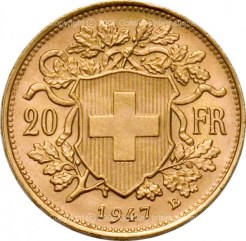Swiss Central Bank Begins Manipulation of Franc
September 6, 2011
Bankers move against Franc to try to save Euro. Swiss economy to suffer due to artificial manipulation.
Associated Press
September 6, 2011
GENEVA (AP) — In what experts called a last-ditch “nuclear option,” the Swiss National Bank set a ceiling Tuesday on the value of its currency, which has skyrocketed as traders worldwide frantically search for a safe haven in volatile times.
Aiming to protect Swiss exports and the country’s vital tourism industry, the bank said it would spend whatever it takes to keep the Swiss franc from strengthening beyond 1.20 francs per euro. It also indicated it might take even more measures to weaken it further.
“The current massive overvaluation of the Swiss franc poses an acute threat to the Swiss and carries the risk of a deflationary development,” the bank said in a statement, announcing the goal of “a substantial and sustained weakening of the Swiss franc.”
The reaction in markets was immediate. The euro, which had been trading around 1.10 francs before the announcement, shot up to 1.2024 afterward. The dollar jumped from 0.7850 francs to 0.850 francs.
The Swiss stock market cheered the move, with the main index jumping 4.7 percent.
With the United States flirting with recession, many European nations mired in debt, and stock markets showing extreme volatility, international traders have poured money into Swiss money accounts, causing the franc to jump in value. The Swiss economy also fared better than most other nations in debt-saddled Europe, where the financial sector and governments are being forced to cut spending and pay for expensive bailouts.
Its status as a global safe haven for traders has seen the Swiss franc rally this year by as much as 40 percent against the dollar and 30 percent against the euro.
Tuesday’s move was the first time since 1978 that the Swiss authorities have limited the franc’s value in this way against another currency.
The SNB said it would “no longer tolerate” an exchange rate below the minimum of 1.20 francs per euro and would “enforce this minimum rate with the utmost determination and is prepared to buy foreign currency in unlimited quantities.”
But it said even the rate of 1.20 francs per euro was too strong for the franc and hoped it “should continue to weaken over time.” The central bank said it was prepared to take further measures to make that happen.
The Swiss business federation welcomed the SNB’s decision but indicated its members would like the franc to drop even further against the euro.
“It’s clear that a fair exchange rate would need to be lower,” board member Rudolf Minsch said. “We believe a fair rate to be between 1.30 and 1.40 francs, but this is a good compromise between what’s needed and what can be done.”
Jennifer McKeown, a European economist at London-based Capital Economics, called the decision “a bold move” even though 1.20 francs per euro is still relatively strong for the Swiss currency.
“With exports clearly at risk of slumping, the bank must have felt that it had no other choice,” she said in a note to investors.
Switzerland’s export-driven economy has long thrived on sales of foods like chocolate and cheese, as well as pharmaceuticals, watches, special machinery and tools. Its main trading partners are Germany, the United States, Italy and France.
The Swiss government says because of the soaring franc, it expects a slowdown in growth from 2.4 percent last year to 2.1 percent for 2011 and to 1.5 percent in 2012.
Overall exports rose 0.9 percent in the second quarter, helped by sales of chemicals and watches. But the government said exports of other items such as jewelry, precious metals, machinery and electronics were on the decline.
The last time the Swiss franc’s value was limited was 1978, when its exchange rate against the German mark was lowered. That was achieved at a huge cost, however, said Simon Derrick, a senior analyst at The Bank of New York Mellon.
Derrick said the SNB must now feel added pressure managing its cash reserves, after announcing in July a loss of 9.9 billion francs on its foreign exchange holdings for the first half of the year.
“By its promise to buy ‘unlimited quantities’ of foreign currencies it has effectively agreed to provide an artificially cheap exchange rate for anyone who wishes to seek a safe haven from the uncertainties of the eurozone,” he wrote.
The European Central Bank’s governing council issued a terse statement immediately after the announcement indicating they had no role in the Swiss currency move.
“The governing council takes note of this decision, which has been taken by the Swiss National Bank under its own responsibility,” the ECB said.

